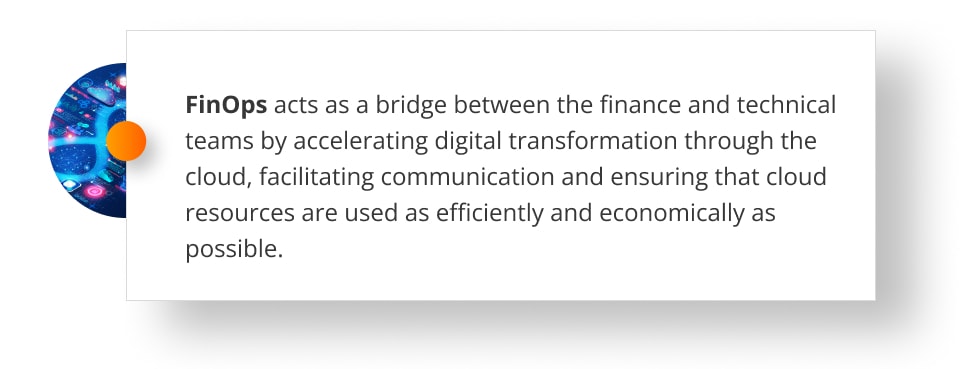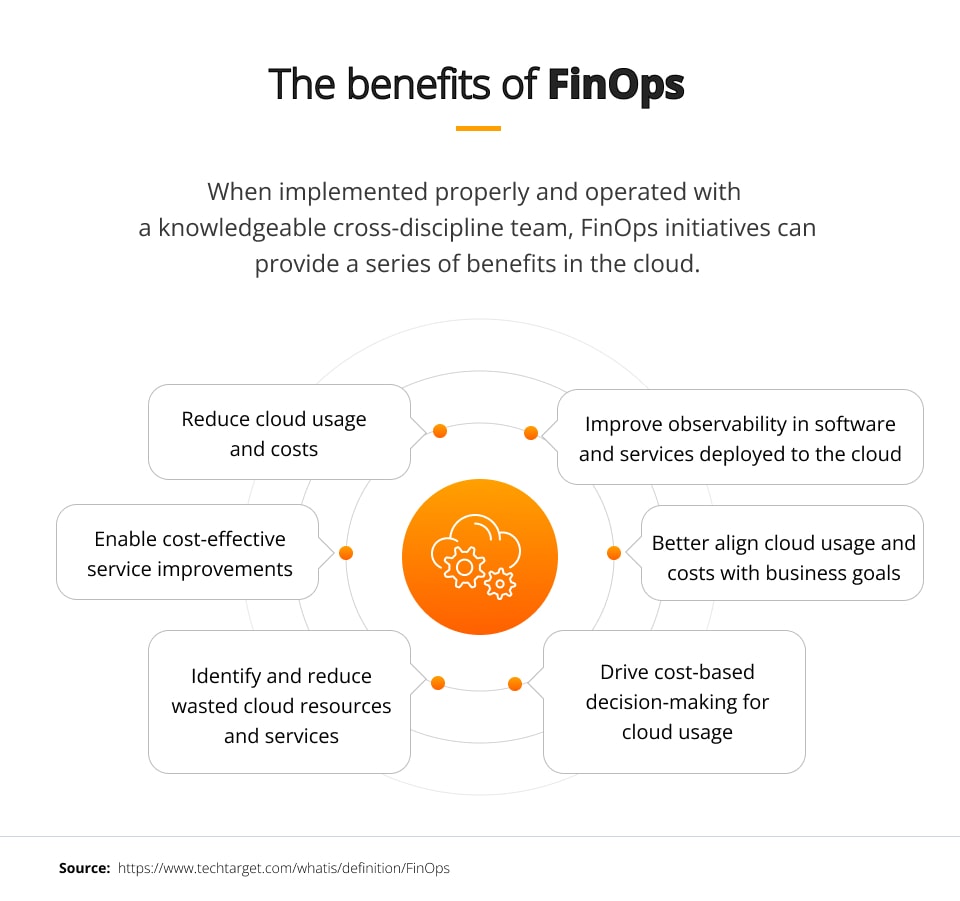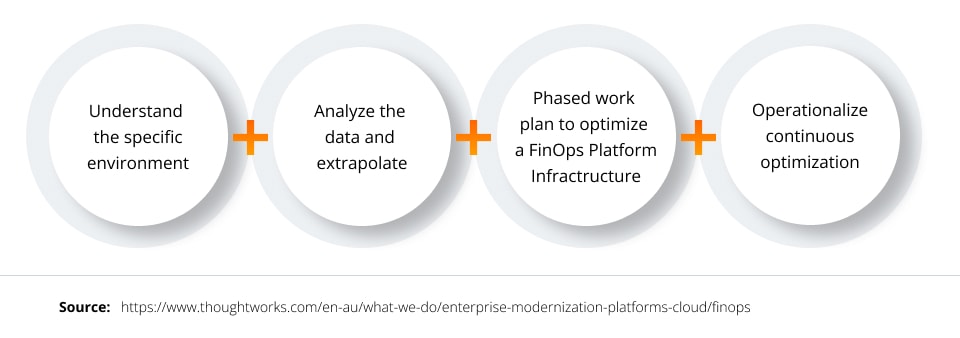
FinOps: bridging finance and operations in cloud
As cloud costs spiral out of control without proper management, FinOps emerges as a beacon of financial sanity, bridging the gap between finance and operations. Keeping costs down while leveraging the cloud's full potential is easy with this collaborative practice.
What is FinOps?
FinOps is a relatively new practice, but it is quickly gaining popularity. In essence, FinOps acts as a bridge between the finance and technical teams by accelerating digital transformation through the cloud, facilitating communication and ensuring that cloud resources are used as efficiently and economically as possible.
As a cloud financial management discipline and as a cultural practice at the same time, FinOps is a structure that enables organisations to maximise their business value by collaborating between engineering, finance, technology, and business teams to make data-driven decisions about their budgets and investments.
FinOps can help organisations save money, improve efficiency, and reduce risk. It can also help organisations make better decisions about allocating their cloud resources.
How modern enterprises are adapting to digital transformation
Businesses striving to thrive in the digital era must embrace digital transformation (DX). This process of integrating digital technology into all areas of the business can help enterprises improve efficiency, productivity, and customer experiences.
People, processes, and technology must all be considered for organisations to navigate DX successfully. Furthermore, they must develop a roadmap for achieving their digital future.
Businesses swiftly adopt cloud services to accelerate digital transformation and overcome cloud implementation challenges. Cloud computing, a cornerstone of digital transformation, provides the scalability, flexibility, and agility needed for a digital-first world. Cloud consulting services and financial ops are crucial, assisting businesses in comparing cloud providers and implementing successful cloud strategies.
Principles of Cloud FinOps for the modern business
- Collaboration: A core principle of Cloud FinOps is collaboration between finance and technology teams. As a result, financial strategies will align with operational strategies and cloud resources will be efficiently utilised.
- Accountability: The goal of Cloud FinOps is to optimise cloud costs by assigning accountability for resources used and spending. It encourages teams to take responsibility for their cloud usage and costs.
- Transparency: Cloud FinOps requires transparency. Providing cost and usage data to all relevant stakeholders allows them to make informed decisions and adjust operations in the cloud.
- Cost optimisation: Another principle of FinOps is cost optimisation, which involves monitoring cloud operations management continuously, identifying challenges and cost-saving opportunities, and implementing strategies to minimise waste.
- Reporting: The principle simplifies the process of generating and analysing cloud cost and usage reports. 6.
- Centralisation: The final FinOps principle refers to the consolidation of cloud financial management activities in a central team. As a result, the organisation will be able to maintain consistency, visibility, and accountability.
Benefits of FinOps adoption
The adoption of FinOps by cloud-powered organisations unlocks a multitude of benefits. From optimising cloud costs and enhancing resource utilisation to fostering collaboration and aligning spending with business goals, cloud financial operations empower businesses to harness the true power of the cloud.
At Future Processing, we have seen the benefits of adopting FinOps approach in real numbers, for example one of our clients, Trustmark, achieved a 72% reduction of operating costs after a seamless migration of 53 services and 5 pipelines on Azure DevOps.
FinOps framework: bridging finance and tech
The FinOps framework bridges the gap between finance and technology, empowering organisations to optimise cloud spending and maximise business value. It fosters a culture of shared responsibility and transparency, enabling data-driven decision-making and alignment across teams.
Implementing cloud services presents many challenges, and FinOps plays an important role in addressing them. With financial ops, cloud management is transformed from a reactive cost control exercise to a proactive and strategic value generator. A comprehensive guide to cloud strategy can help organisations navigate these challenges and achieve their cloud transformation goals.
The FinOps lifecycle: plan, monitor and optimise cloud resources
For the effective management of cloud resources, FinOps consists of three phases:
- Planning: During this phase, businesses set financial goals, allocate budgets, establish governance policies, and develop a cloud migration plan.
- Monitoring: Continuously monitoring cloud usage and costs is essential. During this phase, discrepancies and optimisation opportunities are identified through real-time tracking and reporting.
- Optimisation: Data gathered during the monitoring phase can be used to optimise cloud resources. The right-sizing, scaling, and cost-saving measures are implemented in this phase.
Common challenges of cloud financial operations
Managing Cloud financial operations can be complex and challenging, with numerous obstacles to overcome. Among the challenges are:
- Gaining visibility into cloud costs: Cloud spending can be complex and opaque, making it difficult to track and control.
- Optimising cloud resource utilisation: Organisations often over-provision cloud resources, leading to unnecessary costs.
- Aligning cloud spending with business goals: It can be challenging to ensure that it aligns with the organisation’s overall business objectives.
- Managing cloud governance and compliance: Organisations must comply with a variety of cloud governance and compliance requirements.
- Managing cloud risk: Cloud computing poses many risks to organisations, such as security risks and data breaches.
Evolving trends in FinOps solutions and what they mean for businesses
As technology advances and business needs change, FinOps is continually evolving. Here are a few notable trends:
- Automation: Increasingly, cost management processes of cloud financial operations are being automated, which enhances efficiency and accuracy.
- Cloud-native tools: Cost management and optimisation are getting simplified through the integration of cloud-native tools and services, such as Cloud Operations Services.
- DevOps integration: By aligning FinOps practices with DevOps processes, developers can develop faster and more cost-effectively.
- Compliance and security: Compliance and security are increasingly important within the FinOps framework, ensuring the protection of sensitive data and compliance with regulations.
The inevitable shift towards a FinOps approach in cloud management
As the cloud revolution continues to transform the IT landscape, the inevitable shift towards a FinOps approach in cloud management has become a necessity rather than a choice. Without exaggeration, it can be said, that FinOps adoption is essential for organisations to maximise the value of their cloud investments. The holistic approach to cloud financial management helps organisations to optimise costs, improve efficiency, and achieve their cloud transformation goals.
With cloud deployments becoming increasingly complex and scalable, along with pressure to optimise cloud costs and maximise business value, FinOps is inevitable in cloud management. The benefits of FinOps adoption are well-documented, including significant cost savings, enhanced resource utilisation, improved decision-making, and alignment with business objectives. Thus, for organisations to achieve their cloud transformation goals and maximise the value of their cloud investments, FinOps is a necessity.







